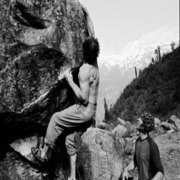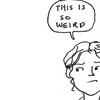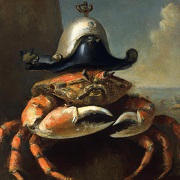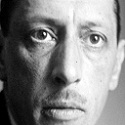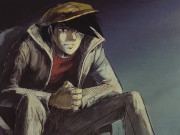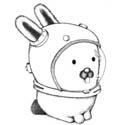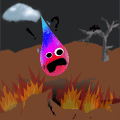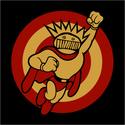|
Since threads about specific authors wither and die let's talk about good books. I just finished If on a winter's night a traveler by Italo Calvino and thought it was pretty good tho it seemed like as it went on it got increasingly more blunt about the messages it was trying to convey until eventually it was just Calvino punching you in the head and telling you that no one just reads books any more. Also, for a book about the frustration of a reader who can't get closure on a series of novels every single first chapter worked perfectly well as a self contained short story that was satisfying enough to read. Weirdly I think I would have enjoyed it more if the stories left questions unanswered, ended on cliffhangers or just felt incomplete rather than being consistently readable and fine. what good books are you reading?
|
|
|
|

|
| # ? Apr 29, 2024 17:27 |
|
Not too long ago I reread Blood Meridian with a sort of academic accompaniment that I might glean some meaning from the more biblically rooted passages. I think McCarthy belongs in the greatest contemporary writer conversation, but there's no denying his style, while elegiac and beautiful, feels slightly mannered towards the middle section of the book. What really surprised me was the sympathy I felt for most of the characters, excluding the Judge. It's easy to write them off as terrible men, but to my mind the point was they were either ignorant or desperate and easily manipulable. I really liked how he captured the terror and savagery of the times, from the hermit to the Indian attacks, so viscerally. Read this book. The slog through the middle is worth it for the end
|
|
|
|
Lately I've been reading a lot of Vladimir Nabokov's short stories. Some are better than others, but a the best of them have this great mood of everything being just a little bit off, a great tricky sort of feeling: A Visit To the Museum or Terra Incognita immediately come to mind. But one that especially stands out is La Veneziana, which combines a love triangle with an art restorer named McGore who claims to have an ability to disappear into paintings. Does he mean it literally? Is the restorer really restoring or forging? I like how VN plays around with the idea of reality here, pushing you out of your comfort zone; it reminded me a lot of his novel The Real Life of Sebastian Knight, although on a smaller scale. I immediately went back and re-read it after finishing it.
|
|
|
|
Fly McCool posted:Not too long ago I reread Blood Meridian with a sort of academic accompaniment that I might glean some meaning from the more biblically rooted passages. I think McCarthy belongs in the greatest contemporary writer conversation, but there's no denying his style, while elegiac and beautiful, feels slightly mannered towards the middle section of the book. Of McCarthy's work I prefer The Road but Blood Meridian is very good. I'm not sure any of Glanton's men should be seen with sympathy. Even The Kid starts out bad before joining Glanton's gang and ends bad long after the gang breaks up. No one has redeeming qualities. A question about what happens in the jakes at the end: did the judge kill the kid, rape the kid or (since the judge is a metaphor for war in all it's aspects including how it haunts it's victims) did the kid finally just break down? Why would the men who come to the jakes in the aftermath be amazed and stunned if it was just an act of violence when everyone in that world is so used to violence?
|
|
|
|
Rando posted:Of McCarthy's work I prefer The Road but Blood Meridian is very good. The end is left ambiguous to an extent. Remember the kid willfully enters the jakes amd 'surrenders to the judges dark and terrible embrace' or something along those lines. I think the kid just loses the will to live after their discussion. This is particularly disturbing given the kids bellicose nature. As to what literally happened, my take was that the judge likely violated, killed, then dismembered the Kid. As far as the kid and Glanton's men being good or evil, I'm not sure there's much of a precedent for either, at least before they embark. The Kid has a taste for violence, but we dont know much more about him than that. He is initially enticed by the material gain of the expedition of memory serves correct. I think most were misguided and manipulated and that their hate for the Apache was very real, and vice versa. I find them sympathetic largely because most of them seem to be there because they're incapable of doing much else. rest his guts fucked around with this message at 22:22 on Feb 10, 2014 |
|
|
barkingclam posted:Lately I've been reading a lot of Vladimir Nabokov's short stories. Some are better than others, but a the best of them have this great mood of everything being just a little bit off, a great tricky sort of feeling: A Visit To the Museum or Terra Incognita immediately come to mind. There are so many layers of meaning in Nabokov's short fiction, you really can't go wrong. Speaking of trickery, one of his stories ("Vasiliy Shishkov")may be the ultimate literary prank: basically, a critic kept denigrating Nabokov's writing, so Nabokov wrote poetry he knew the critic would like under a pseudonym, got the critic to praise the pseudonym, then wrote a short story with the psuedonym as a protagonist, at the end of which the psuedonymic protagonist evaporates into thin air. http://www.theguardian.com/theguardian/1999/apr/17/weekend7.weekend2 http://books.google.com/books?id=sV...20story&f=false
|
|
|
|
|
barkingclam posted:Lately I've been reading a lot of Vladimir Nabokov's short stories. Some are better than others, but a the best of them have this great mood of everything being just a little bit off, a great tricky sort of feeling: A Visit To the Museum or Terra Incognita immediately come to mind. The Real Life of Sebastian Knight is one of my absolute favorite novels of all time, so I will have to give that short story a shot. The last really amazing fiction book I read was probably Vampires in the Lemon Grove by Karen Russell, which is a collection of short stories. Some of them are merely okay, but there's a few that really stuck with me, especially "Reeling for the Empire". I've not been reading nearly as much fiction lately as I used to, which I think is because I read a lot of books, and my standards for non-fiction are lower.
|
|
|
|
CestMoi posted:Since threads about specific authors wither and die let's talk about good books. I like Italo Calvino, but it's been several years since I've read that one. I love Invisible Cities though and have reread it a couple times.
|
|
|
|
I have said this before but all my favorite authors commit suicide. Sadegh Hedayat, Osamu Dazai and Yukio Mishima (I'm counting his as a suicide. There is zero chance that he thought that he would actually succeed and was not just a way for an "honerable" way to die.). I'm rereading The Blind Owl again because it is still one of my favorite books. its really good and I compared it to Enter The Void before and its a really good way to look at the two pieces of work that are in different mediums. Also I have The Plague by Camus that I'm about to get into because somehow I managed to never read it. Stravinsky fucked around with this message at 00:56 on Feb 11, 2014 |
|
|
|
Enfys posted:I like Italo Calvino, but it's been several years since I've read that one. I love Invisible Cities though and have reread it a couple times. From what I've seen of Invisible Cities it seems like my kind of poo poo. It seems more like it'd be a bit chilled out and letting itself be interesting, while A winter's night is trying really hard to be clever a lot of the time, to its detriment. First I've got the Crying of Lot 49 to read and a bunch of crap on my kindle which I want to make go away so I don't have to scroll through a bunch of pages of books when I want to get to the dictionary.
|
|
|
|
Stravinsky posted:I have said this before but all my favorite authors commit suicide. Sadegh Hedayat, Osamu Dazai and Yukio Mishima (I'm counting his as a suicide. There is zero chance that he thought that he would actually succeed and was not just a way for an "honerable" way to die.). Have you read The Decay of the Angel? If so, do you buy into the idea that it's Mishima refuting his own legacy?
|
|
|
|
Declan MacManus posted:Have you read The Decay of the Angel? If so, do you buy into the idea that it's Mishima refuting his own legacy? It has been a long time, but I really did not remember that being the case at all. Instead I thought he was embracing it. I have not heard of anyone saying anything like that. Do you remember what reasons people have for thinking that?
|
|
|
|
I'm currently reading Bastard Out of Carolina by Dorothy Allison, which I was surprised to find was written in the early 90's (I'd heard of it before and for some reason thought it was from the 60's). So far like it a lot, a bit lighter than I was expecting but I have a feeling some hosed up things are around the corner, in any case the writing is excellent. However I wanted to recommend to you guys a book I read last year, a classic that really everyone should read - The Leopard by Guiseppe di Lampedusa. The story itself is a sort of simple character study, at different points in his life, of a somewhat liberal aristocrat in Sicily at the time that Italy was starting to unite and turn towards republicanism, at the time of Garibaldi. But what really makes the book special is these very strong and emotional images that the author creates, moments that make it seem almost like you are reading a series of paintings. Also more recently I read The Son by Philip Meyer which is definitely the best new American novel I have read in a long time. It's arguably genre (western) but I think it's one of those books that really transcends genre. It follows three characters within one Texas family, starting in 1848 when a family of settlers is murdered by the Comanche and their teen son taken captive - he lives as a Comanche for three years until they die mostly of disease, at which point he goes back to white society and joins the Texas Rangers, and eventually becomes a rancher. It also follows his son who is the sort of liberal "black sheep" of the family, and his great-granddaughter who took over the beef and oil empire he built, and rotates between these three viewpoints throughout the book.
|
|
|
|
Stravinsky posted:It has been a long time, but I really did not remember that being the case at all. Instead I thought he was embracing it. I have not heard of anyone saying anything like that. Do you remember what reasons people have for thinking that? From hazily remembered lit crit and double-checking on Wikipedia, Tōru and Honda are supposed to be self-portraits, the ending was written after Mishima plans on seppuku, and Honda implying that if Kiyoaki never existed, then maybe he never existed. It could be people overreaching with pop psychology or their could be some teeth to it. I'm on the fence.
|
|
|
|
CestMoi posted:Italo Calvino Italo Calvino is a weird author for me because I love all of his books in theory but then I am typically bored as hell when actually in the process of reading them. Like I always get excited by the descriptions of his books, but none have actually enthralled me and made me fall in love with him as an author. I recently read Cosmicomics for the exact same reason and while it had all of the elements of being something I would love it just didn't really hook me in and make me want to go out and buy another of his books, or recommend it to all of my friends or anything. I am not currently reading anything applicable (one genre book and one non-fic) but one of the best books I read last year was The Republic of Wine by Mo Yan. It alternates between three narratives: a detective novel being written by "Mo Yan" (involving a drunken detective and cannibalism), letters from a PhD student in "liquor studies" who aspires to be an author and is sending letters and short stories to Mo Yan, and Mo Yan's replies to these letters. There is obviously a ton of focus on liquor and food, and the narratives start to interact in interesting ways: the PhD student's short stories are highly autobiographical but get progressively weirder, the line between reality and fiction starts to blur, and also I am pretty sure Mo Yan starts to blatantly rip off this kid since the same elements from his stories start showing up in the detective novel. My favorite line of the novel comes when the "author" is drunk and writing in stream of consciousness: (spoiler for an awesome line) "drat some will say I'm obviously imitating the style of Ulysses in this section Who cares I'm drunk" We did have a Mo Yan thread for a short while just after he won the Nobel Prize, but unfortunately it fizzled out. I have also read The Garlic Ballads which was funny but also pretty depressing. I have Big Breasts & Wide Hips and Life and Death are Wearing Me Out queued up, I will post about them when I read them. Guy A. Person fucked around with this message at 19:10 on Feb 11, 2014 |
|
|
|
Declan MacManus posted:From hazily remembered lit crit and double-checking on Wikipedia, Tōru and Honda are supposed to be self-portraits, the ending was written after Mishima plans on seppuku, and Honda implying that if Kiyoaki never existed, then maybe he never existed. It could be people overreaching with pop psychology or their could be some teeth to it. I'm on the fence. Ok, yeah I could see that totally. I would have to reread it again to really form an opinion one way or another now. Hey Earwicker, you ever finish you british huffy historian talking about Russia book? How did it turn out?
|
|
|
|
Stravinsky posted:Hey Earwicker, you ever finish you british huffy historian talking about Russia book? How did it turn out? No I'm still in the beginning of the Gorbachev era, decided to put it down a bit for some fiction because it was irritating me. Basically the main problem with it is that it focuses almost entirely on politics, and Russians are presented as an "other" pretty much the entire time. There's a constant refrain of "and here's another point at which the Russians could have created a nice liberal democracy like a real country but they hosed it up again". If only Novgorod hadn't been destroyed. If only Kiev had stayed the dominant Russian power instead of Moscow. If only Catherine would have kept her youthful ideas and stayed in agreement with Voltaire. If only Alexander II hadn't been blown up. If only the Mencheviks had prevailed. If only Lenin's letter about Stalin had been found. If only Kruschev wasn't a "crude peasant", and so on. But no, the Russians are forever doomed to the "Asiatic" autocracy permanently embedded into their psyche by the Mongols.
|
|
|
|
These are my top five literary novels that I've read in the past 2 years, in no particular order: 1) Serena by Ron Rash - I think Ron Rash is going to blow up this year the way Daniel Woodrell did after the movie Winter's Bone hit the big leagues since this book is being made into a movie. This is a fantastic book, very much a Southern Gothic with Shakespearean overtones, and Serena is a fascinating and engimatic character. 2) Tampa by Alisa Nutting - the people that read this book will either love it or hate it - there is absolutely no middle ground for this novel, it is extremely polarizing and that's partly what I love about it. 3) As Meat Loves Salt by Maria McCann - highly underrated but critically praised historical fiction that more people should read. 4) Under the Skin by Michel Faber - so amazingly good, and it starts out like a typical genre book but like most outstanding fiction (like Book Barn's much adored Blood Meridian, in fact) it blooms into something so much more that defies easy categorization. Again, since ScarJo is starring in the movie based on this book I expect this will blow up this year, which I'm glad about because this book deserves very much to be read as much as possible. 5) Revolutionary Road by Richard Yates - For my LitFic reads I've been trying to go as contemporary as possible (sticking to books written in the 21st century) but this book was really gut-wrenching. I was depressed for days afterwards and that says a lot. I don't know if it would have hit me as hard as it did if I had read it in my twenties but Yates does a fantastic portrayal what it's like to be middle aged and to realize that you're trapped and mired in the banality of suburbia.
|
|
|
|
Hieronymous Alloy posted:There are so many layers of meaning in Nabokov's short fiction, you really can't go wrong. Speaking of trickery, one of his stories ("Vasiliy Shishkov")may be the ultimate literary prank: basically, a critic kept denigrating Nabokov's writing, so Nabokov wrote poetry he knew the critic would like under a pseudonym, got the critic to praise the pseudonym, then wrote a short story with the psuedonym as a protagonist, at the end of which the psuedonymic protagonist evaporates into thin air. I read a Nabokov short story about a young man going mental over jam, an ending which impressed upon me that there's probably some acrostic or anagram going on that I couldn't be bothered to figure out. Poutling posted:5) Revolutionary Road by Richard Yates - For my LitFic reads I've been trying to go as contemporary as possible (sticking to books written in the 21st century) but this book was really gut-wrenching. I was depressed for days afterwards and that says a lot. I don't know if it would have hit me as hard as it did if I had read it in my twenties but Yates does a fantastic portrayal what it's like to be middle aged and to realize that you're trapped and mired in the banality of suburbia. A fun thing to do is get a collection of Yates' short stories (which will be a tome, as that's how he paid the bills) and read a hundred tiny Revolutionary Roads.
|
|
|
|
Mr. Squishy posted:I read a Nabokov short story about a young man going mental over jam, an ending which impressed upon me that there's probably some acrostic or anagram going on that I couldn't be bothered to figure out. Give Pale Fire a spin and realize that Nabokov is loving with you because that's all he knows
|
|
|
|
Mr. Squishy posted:A fun thing to do is get a collection of Yates' short stories (which will be a tome, as that's how he paid the bills) and read a hundred tiny Revolutionary Roads. That sounds pretty amazing but I don't think my heart could take it. I'd probably have to go on prozac 
|
|
|
|
I recognise so few of these titles it's ridiculous. I've heard of "If on a winter's night travel", "As Meat Loves Salt", Nabokov and McCarthy but all other titles mentioned here are completely alien to me (as in "never seen them mentioned anywhere"). I have not read a single book mentioned. Yet I've been reading quite a lot in recent years and have spent plenty of times looking for new good titles to read and talking to other book fans. Guess I'm nowhere as knowledgeable about literature as I thought. Anyway, I am planning to read "The Name of the Rose" by Umberto Eco as severals friends have been raving about this book for a while now. I hope it's as good as they say it is and that they exaggerate how much time he spends on describing scenery.
|
|
|
|
Walh Hara posted:I recognise so few of these titles it's ridiculous. I've heard of "If on a winter's night travel", "As Meat Loves Salt", Nabokov and McCarthy but all other titles mentioned here are completely alien to me (as in "never seen them mentioned anywhere"). I have not read a single book mentioned. Yet I've been reading quite a lot in recent years and have spent plenty of times looking for new good titles to read and talking to other book fans. Guess I'm nowhere as knowledgeable about literature as I thought. There are a lot of books out there and it's impossible that anyone knows all of them at any given time, so don't feel bad if you don't know stuff. There is no one true universal canon of books you must know. The Name of the Rose is very good and the scenery descriptions are probably the "worst" at the beginning. It reads pretty quickly for being ~500 pages and was interesting enough to inspire an ill-advised movie.
|
|
|
|
Earwicker posted:However I wanted to recommend to you guys a book I read last year, a classic that really everyone should read - The Leopard by Guiseppe di Lampedusa. The story itself is a sort of simple character study, at different points in his life, of a somewhat liberal aristocrat in Sicily at the time that Italy was starting to unite and turn towards republicanism, at the time of Garibaldi. But what really makes the book special is these very strong and emotional images that the author creates, moments that make it seem almost like you are reading a series of paintings. I really love this book. I read it in translation, but it really stuck with me. What I particularly enjoyed was its refreshing sense of fatalism and as you pointed out the intensely felt scenes, and the wonderful sense of time and decay.
|
|
|
Walh Hara posted:Anyway, I am planning to read "The Name of the Rose" by Umberto Eco as severals friends have been raving about this book for a while now. I hope it's as good as they say it is and that they exaggerate how much time he spends on describing scenery. This is really good but I found some of the characterization at the beginning to be a little contrived. Give it time though and you'll be hooked. If you like it then you should read his other book, Foucault's Pendulum which is my all-time favorite novel but a considerably harder read than The Name of the Rose. I just finished Yukio Mishima's The Sailor Who Fell from Grace with the Sea and holy crap was it good. It's all about a particularly idiosyncratic kind of alienation though, I feel like someone reading it would either find themselves being very sympathetic to the characters or find their motivations very alien.
|
|
|
|
Walh Hara posted:
The important thing to remember about reading The Name of the Rose is that Eco front-loads a lot of his crazy description as a test to his reader. If you read in a little ways you'll get to an epic-length description of the monastery doorway. In his postscript Eco talks about how he made that doorway description deliberately intimidating to scare away readers who weren't going to be able to handle the rest of the book. It's a test -- if you get through it, whether by skipping ahead or reading straight through, you can probably handle the rest of the novel, even if you just do it by skipping over all the hard parts and reading for story. Declan MacManus posted:Give Pale Fire a spin and realize that Nabokov is loving with you because that's all he knows Nabokov is loving with you and it's beautiful. Poutling posted:1) Serena by Ron Rash - I think Ron Rash is going to blow up this year the way Daniel Woodrell did after the movie Winter's Bone hit the big leagues since this book is being made into a movie. This is a fantastic book, very much a Southern Gothic with Shakespearean overtones, and Serena is a fascinating and engimatic character. I was at a book festival once with a friend of mine who was a presenter and he took me along as his guest to the opening keynote speaker,Dorothea Benton Frank, known for such menopause-lit "classics" as The Land of Mango Sunsets" (hint: it contained the phrase "the sunset was the color of mangoes"). We were in the far back, sitting through her odious reading so we could get a crack at the fancy buffet, because at the time a free meal was a big deal for both us. We turned around and saw Ron Rash (who apparently knew my friend somehow? I didn't know him from Adam at the time) already powering through the buffet tables, completely ignoring the speaker, and beckoning to the two of us with a hand that held a plate full of salmon. Man has his priorities in order. Hieronymous Alloy fucked around with this message at 16:33 on Feb 13, 2014 |
|
|
|
|
Hieronymous Alloy posted:I was at a book festival once with a friend of mine who was a presenter and he took me along as his guest to the opening keynote speaker,Dorothea Benton Frank, known for such menopause-lit "classics" as The Land of Mango Sunsets" (hint: it contained the phrase "the sunset was the color of mangoes"). We were in the far back, sitting through her odious reading so we could get a crack at the fancy buffet, because at the time a free meal was a big deal for both us. We turned around and saw Ron Rash (who apparently knew my friend somehow? I didn't know him from Adam at the time) already powering through the buffet tables, completely ignoring the speaker, and beckoning to the two of us with a hand that held a plate full of salmon. Man has his priorities in order. That's fantastic. What's not to like about a man who gets his omega 3 fix and loves buffets? I really have to read The Cove, it's on my gigantic to read pile. Has anyone read S. by Doug Dorst yet? I ordered a copy online and I'm waiting for it to come in. I'm a sucker for gimmicks and I loved the fact that he partially based it off the whole mystery surrounding the author B. Traven.
|
|
|
|
Poutling posted:Has anyone read S. by Doug Dorst yet? I ordered a copy online and I'm waiting for it to come in. I'm a sucker for gimmicks and I loved the fact that he partially based it off the whole mystery surrounding the author B. Traven. Let me know how it is; I heard about it the other day and it looked interesting. I have been trying to look for more books that I wouldn't be able to read on my Kindle like this or House of Leaves. Otherwise the Kindle is too good a deal to ignore in most cases. Also what is with J.J. Abrams' involvement in the book? He is listed as "creator", is he just an idea and finance man or did he also have a hand in writing it?
|
|
|
|
Guy A. Person posted:Let me know how it is; I heard about it the other day and it looked interesting. I have been trying to look for more books that I wouldn't be able to read on my Kindle like this or House of Leaves. Otherwise the Kindle is too good a deal to ignore in most cases. I read an interview with Abrams and Dorst about S. in the New Yorker. It sounds like it was Abrams' original idea, and he pulled Doug Dorst in. Dorst wrote The Ship of Theseus and they collaborated together on the secondary story that takes place in the margins and extras. Looking forward to reading this. I read Night Film last year which was interesting to me because I felt it was kind of the opposite - a book that works in a much more layered way in an e-format read on a tablet.
|
|
|
|
Earwicker posted:
This book is fantastically good. It's definitely not for the faint-hearted, though - that bit with the Comanches could be brutal. That said, I think my favorite story was Jeannie's, not Eli's. Also, I just found The Leopard in an old used book store and picked it up never having heard of it, so now I'm excited to read that. To bring up another book, I just finished The Good Lord Bird by James McBride, which tells the story of a young black boy who takes up with the abolitionist John Brown - though, for reasons of safety, the young man pretends to be a girl for several years. It's funny as hell and weaves in quite a few other historical figures - thankfully they never seem forced. Of course, those of us who studied U.S. History know his tale doesn't have a happy ending, but overall it's a hell of a good book. I think it won the National Book Award (or maybe the Booker?) this past year.
|
|
|
|
Poutling posted:Has anyone read S. by Doug Dorst yet? I ordered a copy online and I'm waiting for it to come in. I'm a sucker for gimmicks and I loved the fact that he partially based it off the whole mystery surrounding the author B. Traven. I'd still definitely recommend it just for novelty value, but the only person who's going to be moved or impressed by it is someone who has never read another book in their life.
|
|
|
|
Reading Denis Johnson's tiny 'Jesus' Son' and enjoying it a lot - enough to make myself space the stories and not finish them all in one go. He's got a style of writing that really makes you feel different for a while, take the place on the streets alongside the narrator. The plots by themselves aren't anything to write home about, really, but it's the prose and feeling that sells the stories. I've heard good things about his novels as well, but it seems that this style of writing would work better in short term. Are they hugely different in approach? And which ones are considered to be more essential?
|
|
|
|
Poutling posted:I read an interview with Abrams and Dorst about S. in the New Yorker. It sounds like it was Abrams' original idea, and he pulled Doug Dorst in. Ugh, do we really need ideas men running around. Chamberk posted:Also, I just found The Leopard in an old used book store and picked it up never having heard of it, so now I'm excited to read that. I picked up an old copy months ago because the inscription promised it to be the Italian Brideshead, then it was the answer on a quiz with the clue being "the Sicilian Gone with the Wind", and now all this made me pull it down from the shelves and I got 20 pages in it before moving on. They were good pages though.
|
|
|
|
Poutling posted:Has anyone read S. by Doug Dorst yet? I ordered a copy online and I'm waiting for it to come in. I'm a sucker for gimmicks and I loved the fact that he partially based it off the whole mystery surrounding the author B. Traven. I just finished this book today. The Ship of Theseus on its own was pretty good, and the margin notes storyline was entertaining enough, but I'm feeling kind of disappointed by the central, overarching "mystery" of the book. I do appreciate the unique method of storytelling and it is really well executed. I'd recommend it on novelty value alone, as someone already said.
|
|
|
|
I finished S today and would highly recommend it. Consider myself a reader of high brow and difficult literature and thoroughly enjoyed it. Already planning a reread and may fall down the rabbit hole trying to decipher it further. There are clearly unexplained ciphers that will further extend the story and it will be interesting to see how it all plays out.
|
|
|
|
Invicta{HOG}, M.D. posted:I finished S today and would highly recommend it. Consider myself a reader of high brow and difficult literature and thoroughly enjoyed it. Already planning a reread and may fall down the rabbit hole trying to decipher it further. There are clearly unexplained ciphers that will further extend the story and it will be interesting to see how it all plays out. Nice to read a positive review of this book on this forum for a change - all the negative feedback took the wind out of my sails a bit (Ship of Theseus related pun, WAH WAH). I'm not really looking for a life affirming novel with this read, and don't expect all my lit to be life changing- just something entertaining and clever. This sounds right up my alley 
|
|
|
|
The Portrait of a Lady is a good book. If you're interested in the birth of modernism, this book is instructive: it seems like a traditional novel of morals and social relations, but it is far more interested in inwardness and how people think about what they feel than you expect. It's devastating and exhilarating. There are also two versions: Henry James revised it extensively for the New York Editions and included one of his famous prefaces. I first read it in the originally published version and it was great, but you should be aware of the different editions before you make a choice.
|
|
|
|
I read Concrete by Thomas Bernhard today. Basically the ramblings of a crazy old german guy in 120 pages with maybe four or five paragraph breaks. Best part was the last 15 or so pages, and when he goes on an absolutely bonkers rant about dogs. I'm going to read Galveston next because I'm a big fan of True Detective right now and I want to see how Pizzolatto's work looks in novel form. It's apparently McCarthy-esque airport fiction, which is a confusing way to sell a book, but it was $3 so what the hell.
|
|
|
|
Slackerish posted:I read Concrete by Thomas Bernhard today. Basically the ramblings of a crazy old german guy in 120 pages with maybe four or five paragraph breaks. Best part was the last 15 or so pages, and when he goes on an absolutely bonkers rant about dogs. All of his novellas are like that, but I think the ones I've read are pretty powerful. Apparently he did plays and such with regular speaking parts and so on, which surprised me given how monomaniacal his books are. His will forbade their production in his native Austria as a final gently caress-you. He also directly inspired William Gaddis' final novel where a bed-ridden author tries to marshal his sources for an essay on player pianos.
|
|
|
|

|
| # ? Apr 29, 2024 17:27 |
|
His plays are quite odd really. They're actually fairly similar to his books - a series of monologues, delivered as much to themselves as the other characters, but written down on the page as though they're poetry.
|
|
|




